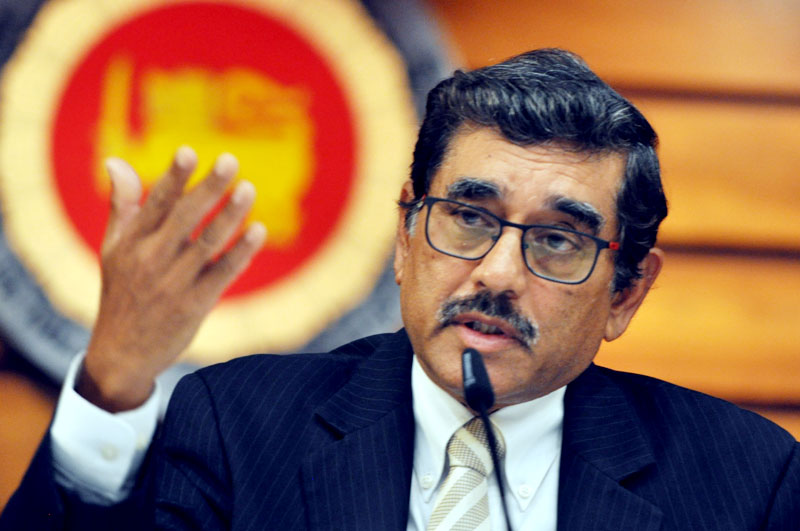Thursday Feb 19, 2026
Thursday Feb 19, 2026
Friday, 6 October 2023 02:03 - - {{hitsCtrl.values.hits}}

Central Bank Governor Dr. P. Nandalal Weerasinghe - Pic by Lasantha Kumara
The Central Bank yesterday took decisive measures to implement interest rate cuts to boost revenue and strengthen its financial position, crucial for continued support from the International Monetary Fund (IMF).
The Monetary Board at its meeting on Wednesday considered the reduction of both, the standing deposit facility rate and the standing lending facility rate by 100 basis points each, bringing them to 10% and 11% respectively. In the August 2023 meeting rates were maintained unchanged.
The Board's rationale for the latest decision stems from the aim at stabilising inflation at the targeted 5% level in the medium term, thereby paving the way for the economy to achieve its potential growth. Over the past six months, the country witnessed a significant drop in inflation, registering just 1.3% in September.
Additionally, the Sri Lankan rupee's strengthening by around 12% against the US dollar this year has been attributed to various factors, including the resolution of a bilateral currency swap with Bangladesh Bank and liquidity provisions in the domestic foreign exchange market, aiding the restructuring of Sri Lanka Development Bonds. As at end September 2023, gross official reserves, including the swap facility from the People’s Bank of China, were estimated at $ 3.5 billion.
“We are closely monitoring the economic activities. The balance of payment (BOP) has improved, the fiscal side has shown progress and we hope the trend would continue. There is also positive expectation on the growth side,” the Central Bank Governor Dr. Nandalal Weerasinghe told journalists yesterday.
According to GDP estimates from the Department of Census and Statistics (DCS), the economy contracted by 3.1% year-on-year (YoY) in the second quarter of 2023. However, the latter half of 2023 is expected to witness a positive growth trajectory, underpinned by expansion across major economic sectors.
Modest external demand conditions may exert slight pressure on near-term growth expectations, despite monetary policy normalisation; improved business sentiments, eased import restrictions, enhanced supply conditions and growth-oriented structural reforms are anticipated to drive economic recovery.
During the eight months ending August 2023, the trade deficit decreased notably, with a significant decrease in merchandise imports due to lower demand and import restrictions, and a relatively low decline in merchandise exports. Earnings from tourism and workers’ remittances have improved considerably thus far in 2023 and expected to improve further in the period ahead. Net foreign investment inflows were recorded in the government securities market so far, despite some sizeable outflows in recent months.
The Central Bank affirmed its expectation that this reduction in policy interest rates, coupled with previous monetary policy easing measures, would soon lead to a significant downward adjustment in market interest rates, particularly lending rates. “The Central Bank will vigilantly monitor developments in market lending interest rates and adapt administrative measures accordingly,” the statement added.
The Board expects that this reduction of policy interest rates, along with the significant easing of monetary policy affected previously, including the directions issued by the Central Bank to licensed banks to reduce interest rates, and the significant reduction of risk premium on Government securities, would accelerate the downward adjustment in market interest rates, particularly lending rates, in the period ahead.
“The financial sector is urged to pass on the benefits of the continued easing of monetary conditions to individuals and businesses adequately and swiftly, thereby supporting the envisaged rebound of the economy,” the statement added.
Although credit extended to the private sector by licensed commercial banks recorded some expansion during the period June to August 2023, a noteworthy recovery is yet to be observed. However, the envisaged further reduction in market lending interest rates in line with policy measures introduced thus far by the Central Bank and improved economic conditions would help boost credit flows to the economy in the period ahead.
